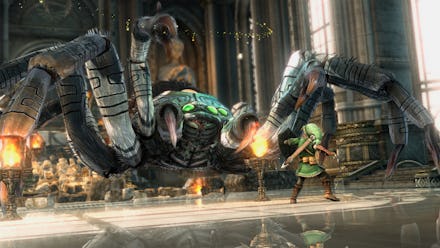The Legend of Zelda: Link to the Past, Key to the Future

Hylians rejoice! On November 22, Nintendo is releasing "The Legend of Zelda: A Link Between Worlds" for the Nintendo 3DS and 2DS. Many gamers throughout the years have called Hyrule their virtual home. Most notably, Nintendo released "The Legend of Zelda: Ocarina of Time" in 1998, heralded by Metacritic as the greatest game of all time. Children did whatever they could to stay up past their bedtimes or get out of school to play. But it wasn't because of the game's graphics or game play. The real draw was the story. It gave the players something they would keep with them for the rest of their lives. It taught them to be courageous, even against the greatest odds.
Courtesy Nintendo.
One of the more memorable moments in Zelda history, the creation of the world, set the groundwork for the story. The three golden goddesses came down from the heavens and "cultivated the land and created the red earth," "gave the spirit of law to the world," and "produced all life forms who would uphold the law." When they returned to the sky, they left behind the three corresponding pieces of the Triforce, one for Power, one for Wisdom, and one for Courage.
These three little triangles certainly gave gamers their red Rupees' worth, time and time again. The Triforce of Power inevitably falls into the hands Ganondorf, the evil sorcerer trying to destroy Hyrule. The Triforce of Wisdom always resides with Princess Zelda, the lofty leader of Hyrule who seeks to preserve all that is good. And, of course, the Triforce of Courage is given to you, Link, a young man with a mysterious past and a mundane present.
This places players in a unique position: aside from their sacred duty to smash pottery, slaughter poultry, and rob shopkeepers of everything but their briefs, they must preserve Hyrule against darkness (or sometimes twilight). Again and again, they must keep evil at bay, following Link through the slowly decaying world.
As a child, he must venture deep into the dark and rotting Great Deku Tree to purge it of the horrific Queen Gohma. And as young Princess Zelda flees Hyrule, the boy must stand between Ganondorf and the Princess's escape. He plunges himself into the unknown by drawing the Master Sword from its stone sheath in the Temple of Time. He is so courageous that he is even willing to trek through (prepare yourself) the Water Temple (egad!) to save Zelda and Hyrule. The one thing that gets him, and hence the player, through each seemingly impossible trial, is courage. Each game in the series depicts a different epic struggle of good and evil for the heart of the world, and each time, the player overcomes all odds with courage.
Video games have become somewhat of a scapegoat for the world's problems, whether by the NRA or Sen. Dianne Feinstein (D-Calif.). But if video games can be blamed for the bad, they should also get a little credit for the good. Some video games, like "The Legend of Zelda," have overwhelmingly positive messages that impact gamers more than violence ever could, and they never forget it. Life is difficult, and it's dangerous to go alone. In this case, the game gives its players the courage to overcome whatever life throws at them, whether it be a Deku Nut or a layoff. For many gamers, "A Link Between Worlds" will function as a link to the past (or, more specifically, its sequel), reminding them that anything can be overcome with a little triangle of courage.